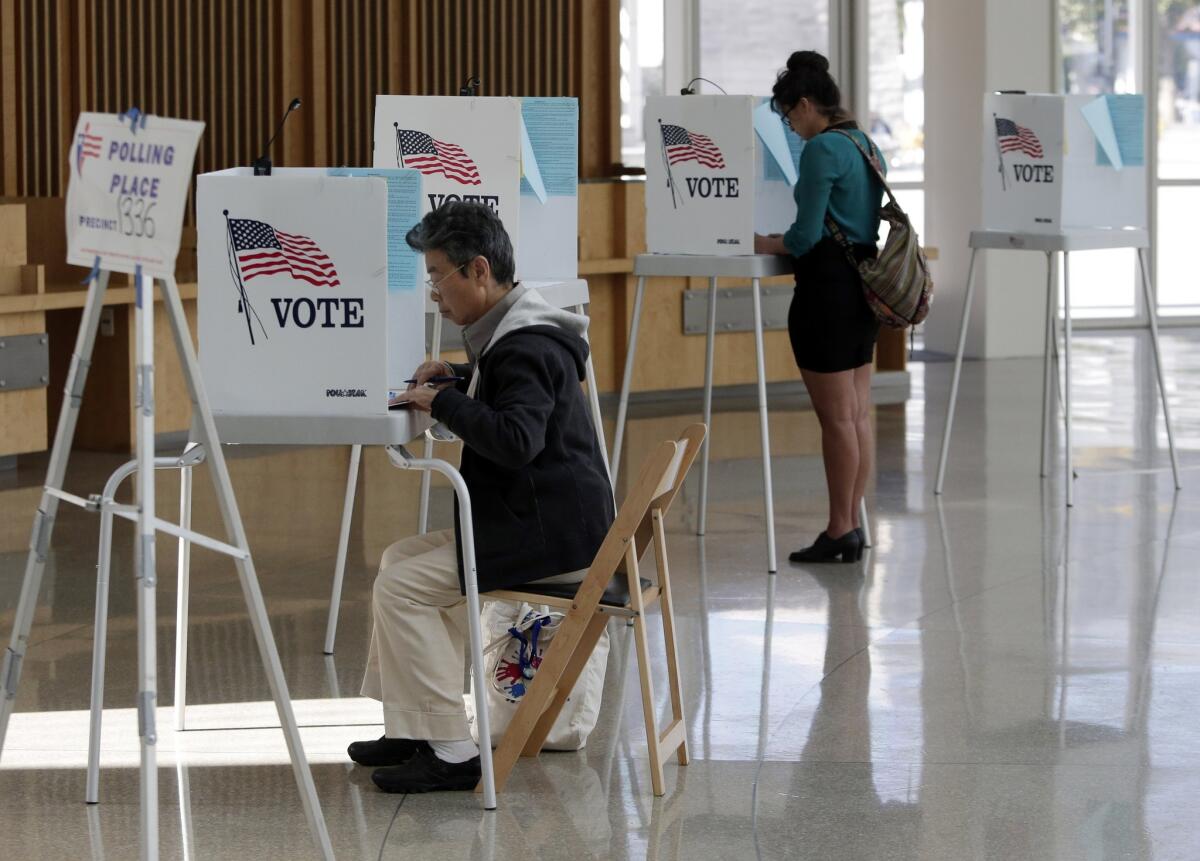Vietnamese translation errors could affect Prop. 46 vote, leaders say

- Share via
An error in translation for voter materials for Proposition 46, which would require drug and alcohol testing for physicians, could be affecting the way Vietnamese Americans vote on the measure Tuesday, community leaders say.
The translation of the measure’s title, which is printed in bold at the top of the Vietnamese language voter guide, includes a phrase that can be interpreted to mean that doctors would conduct drug tests, not be required to take them, said Lucy Huynh, a community health educator at the Orange County Asian Pacific Islander Community Alliance, an organization focused on health and education.
Huynh said she first saw the confusing language on Friday when she opened her ballot, and worries that many voters who aren’t paying close attention will vote incorrectly.
“It’s not just confusing, it’s totally wrong,” Huynh told The Times. “Many people are too busy or won’t have the time to read the whole voter guide. They might rely on the summary and fill in their vote.”
Huynh says she called her boss immediately to point out the error, but by then the organization felt it was too late to do anything about it before Tuesday’s election.
Deidre Nguyen, an Orange County resident and member of the Vietnamese American Voter Registration Committee, said she also noticed the language when she was helping her mother fill out her ballot.
“Just based on my mom’s questions yesterday, I understand where the confusion could come from,” Nguyen said, even though, to her, it was “very clear-cut” what the ballot language meant.
California Secretary of State spokeswoman Nicole Winger told The Times that state election officials use a certified translation vendor, and that officials leave the translated text open to suggestions from community members and native language speakers before election materials are mailed out.
Winger says a panel of six volunteers on a Vietnamese language advisory group reviewed the translated materials. One person did raise questions about the specific language cited by Huynh on July 15.
The feedback was forwarded to the translation vendor, which did not agree, and said the text should be left as is. A separate concern raised by L.A. County elections staff regarding language detailing the ballot measure’s cap on pain and suffering awards in medical malpractice suits was considered, and the language was changed, Winger said.
Orange County Registrar Neal Kelley said about 38,000 Vietnamese language voting materials were distributed in Orange County in this election. Kelley said he was not aware of any complaints related to the translation issue. Los Angeles County, which also reported no complaints, said it received 7,645 requests for Vietnamese language voting materials.
“This really came in under the radar,” says Jacqueline Wu, policy manager at OCAPICA, who was made aware of the issue by Huynh. “Unfortunately for those who do this kind of work, and don’t speak the language as well as they wish they could, it can go undetected.”
Wu says Vietnamese American voters who may misinterpret the ballot summary might be likely to vote in favor of the measure, because they would likely think entrusting professional physicians with drug testing is a good thing.
“The Vietnamese community does think very highly of doctors. They’re a trusted source,” Wu said. “If they read the proposition to say they’re going to do the testing, then that’s something the Vietnamese community would likely be supportive of.”
Wu added that the episode highlights shortcomings in translating government documents for Vietnamese American immigrants.
“We have so far to go, so much progress to make in terms of making sure the government provides resources that are culturally and linguistically appropriate for people who speak Vietnamese,” Wu said.
She added that there are linguistic differences between Vietnamese words and phrases spoken by the refugee community in Orange County’s Little Saigon, and those spoken in Vietnam today.
“I think [the vote] could portray the opinions and the values of the Vietnamese community in ways other than what it otherwise would be,” Wu said.
For more breaking news, follow me @cmaiduc
More to Read
Sign up for Essential California
The most important California stories and recommendations in your inbox every morning.
You may occasionally receive promotional content from the Los Angeles Times.











